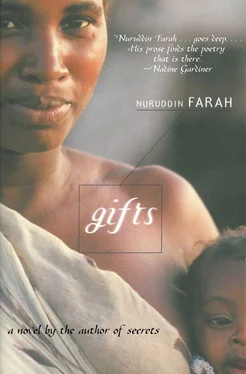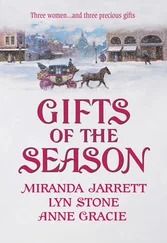Nuruddin Farah - Gifts
Здесь есть возможность читать онлайн «Nuruddin Farah - Gifts» весь текст электронной книги совершенно бесплатно (целиком полную версию без сокращений). В некоторых случаях можно слушать аудио, скачать через торрент в формате fb2 и присутствует краткое содержание. Год выпуска: 2011, Издательство: Arcade Publishing, Жанр: Современная проза, на английском языке. Описание произведения, (предисловие) а так же отзывы посетителей доступны на портале библиотеки ЛибКат.
- Название:Gifts
- Автор:
- Издательство:Arcade Publishing
- Жанр:
- Год:2011
- ISBN:нет данных
- Рейтинг книги:3 / 5. Голосов: 1
-
Избранное:Добавить в избранное
- Отзывы:
-
Ваша оценка:
- 60
- 1
- 2
- 3
- 4
- 5
Gifts: краткое содержание, описание и аннотация
Предлагаем к чтению аннотацию, описание, краткое содержание или предисловие (зависит от того, что написал сам автор книги «Gifts»). Если вы не нашли необходимую информацию о книге — напишите в комментариях, мы постараемся отыскать её.
Gifts — читать онлайн бесплатно полную книгу (весь текст) целиком
Ниже представлен текст книги, разбитый по страницам. Система сохранения места последней прочитанной страницы, позволяет с удобством читать онлайн бесплатно книгу «Gifts», без необходимости каждый раз заново искать на чём Вы остановились. Поставьте закладку, и сможете в любой момент перейти на страницу, на которой закончили чтение.
Интервал:
Закладка:
The foundling began to stir in his cot. Because of the fluctuating voltage of the city’s electricity, the volume of the radio had gone very low, to the point of almost fading completely As the power stabilized, so did the volume of the radio transmission, and the baby went back to sleep.
Duniya was telling herself: People will say wicked things about my motives, probably accuse me of being after the man’s wealth. But what do they know about the motives of a woman like me? Let them badmouth her; she didn’t care what people said. One would have to wait; one couldn’t predict where the tale would lead. When she had accepted to honour her half-deaf mother’s request to marry Zubair, she had said it was an aberration. If that was a lapse, and Taariq only a stop-gap, could Bosaaso be the conflux of their river of souls, flowing into one another, together, for ever and ever?
Bosaaso came in. “Here we are,” he said, placing on a low table a tray on which were three cups, each filled to the brim with tea. Mataan arrived with slices of home-made cake, which Nasiiba had baked.
The three of them were sitting in the courtyard, sipping tea and nibbling cake, when Nasiiba joined them. As usual the young woman was fall of stories and the excitement her tales generated, fall of rumours. While telling snippets of some and narrating fragments of others, Nasiiba helped herself now to Duniya’s tea, now to untouched cakes, and now Mataan’s glass of water, like a pollinating butterfly going from one flower to another.
“Oh, what rumours!” she exclaimed.
Just before noon, a man angered by such a rumour came to call. He had come directly he was given news about the foundling. He was Shiriye, Duniya’s half-brother, her senior by twelve years. His ugly voice announced his arrival.
Entering, he shouted Duniya’s name angrily, not a greeting. Fat-bellied, he met their hostile stare with indifference. He stared back longest at Bosaaso, whose face he couldn’t place, a man who, as far as Shiriye was concerned, was not-family.
Soon he too felt uncomfortable as he inhaled the discomfort in the air and as his gaze met with inimical stares. His Adam’s apple moved fast up and down as if he were choking on his own saliva, and he wiped sweat from his forehead with the intensity of someone concealing a thought best unspoken. Bosaaso, feeling very uneasy, got to his feet to shake the man’s proffered hand. Mataan stood up, not only to surrender his seat to his uncle, but also to receive a gentle pat on his shoulder, while Nasiiba, like Duniya, remained seated and watched the unfolding drama with amused detachment. Before seating himself, Shiriye said to Bosaaso, “I have no memory of ever meeting you and doubt if anyone will bother to introduce us. My name is Shiriye.”
“People call me Bosaaso,” he said, heels together in military fashion, as if it was expected of him when saluting a senior army officer.
Shiriye said, “I am Duniya’s half-brother, a vocation I would not choose for myself, I assure you.” He fell silent but stayed as erect as he could, considering the tension surrounding Mm.
Silent, but never standing still, because Shiriye’s body was incapable of being still. He was like a huge animal whose tail was swishingly busy chasing away flies; or the wide nostril of a hippopotamus twitching of its own accord; or the jaws of a cow munching last night’s cud; or a German shepherd dog airing its oversized tongue. Duniya had these beastly thoughts about her half-brother who was not a handsome man, if the truth was to be told.
He was short, fat and almost totally bald. His belly spilled over his tucked-in shirt and tight army belt like the triple chin of an overweight man with blood-pressure trouble, and he wore a cravat. He breathed like a heavy snorer. He had short hands and stubby fingers, one of which was busy picking his nose and pulling at hairs in his nostrils. “What is all this I hear, Duniya?” he said, taking a step towards her as though he might strike her. Trained to cover his back, like a guilty man expecting to be stabbed from behind, he relaxed his body only when Nasiiba got up and stood out of his way, so he might sit with no one’s chair behind his.
“Now what is this you have heard?” Duniya said.
“I’ve heard about a baby. Where is it?” But he appeared not in the least interested in the baby’s whereabouts, “A foundling, sex male, that is what I have heard.”
“I thought you liked baby boys,” she replied.
“Only if they are mine or if they are genuinely my sister’s,” he said, and burst into laughter, as though this were funny. He fell quiet, embarrassed that no one joined his laugh. Then he spoke slowly, intending to hurt Duniya. He said, “I have heard it said that you have been entrusted with the destiny of a bastard.”
“A what?
“The destiny of a bastard has been entrusted to you,” he said, deliberately.
Nasiiba and Mataan grinned conspiratorially, like clowns at a street-theatre performance, and waited for their mother’s reaction, hoping she would somehow wrong-foot Shiriye and win this round. Bosaaso, however, decided that Duniya and Shiriye were staring like two people who had hurt each other many times before and were unwilling to forget or forgive the hatred this had engendered. And he thought of other quarrels involving his late wife Yussur and her mother. He would not have believed it possible to communicate so much hate in a single, concentrated look as Duniya was then giving Shiriye.
Shiriye was saying, “Bringing up a bastard is sin, the wages of which are the fires of hell and Allah’s anger.”
“How do you know the baby is a bastard?”
“Isn’t he?”
“I said, how do you know he is?”
“We don’t know his parents, do we?”
“Could he not be an orphan, both parents dead?”
“A bastard is a bastard is a bastard. What difference does it make if one parent is known or neither? Where did you find him anyway? In a rubbish-bin?”
Not wanting to get angry, she said, “Nasiiba found him.”
“She is trouble, this Nasiiba of yours. She finds nothing but trouble, is involved in nothing but trouble.” His glower met her grinning eyes. They had nothing but hate for each other, Nasiiba and Shiriye, who appeared in her nightmares to whip her for disobedience. “Look at you,” he now said to his niece. “Your twin-brother has never brought any dishonour into your household.”
Nasiiba said nothing. But Duniya contradicted him, “Don’t you remember predicting Mataan would be an alcoholic before he was ten?”
“I made a big thing out of a small incident,” he said.
“Mataan is no alcoholic, as you can see,” she insisted.
“How do you know?”
Duniya said, “We do things openly in this household, not behind each other’s backs.” They stared daggers at each other, “ I don’t collect bride-wealth behind a younger half-sister’s back, nor do I write letters weighed down with falsehoods describing Duniya as a whore, and Mataan as an alcoholic before reaching his teens.”
Shiriye got up, angry. Bosaaso looked away. The twins stood to one side, whispering in a comer. It was obvious that Duniya had not forgiven her half-brother who, she once said, had never made her a single gesture of kindness, not one; with whom she had never shared a single instant of joy not a second of fellowship. She now said to him, “Sit down. Where are you going? Haven’t you come to visit your sister Duniya? Make yourself at home.
“How can I?” he said, shaking his head ceaselessly.
“We once agreed, you and I,” said Duniya, “that buried bones must not be dug up. But you never stop, like a hungry dog digging by feel and smell And when I put on display the ugly skeletons you’ve dug up, you rise and are ready to depart.” She paused, and was sarcastic again. “Now what in your elder half-brother’s wisdom had you in mind to do for me when you decided to pay me a visit?”
Читать дальшеИнтервал:
Закладка:
Похожие книги на «Gifts»
Представляем Вашему вниманию похожие книги на «Gifts» списком для выбора. Мы отобрали схожую по названию и смыслу литературу в надежде предоставить читателям больше вариантов отыскать новые, интересные, ещё непрочитанные произведения.
Обсуждение, отзывы о книге «Gifts» и просто собственные мнения читателей. Оставьте ваши комментарии, напишите, что Вы думаете о произведении, его смысле или главных героях. Укажите что конкретно понравилось, а что нет, и почему Вы так считаете.











